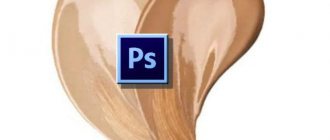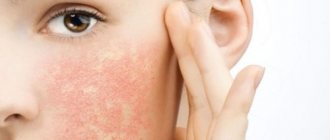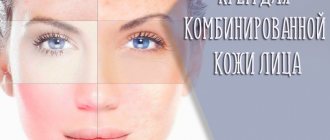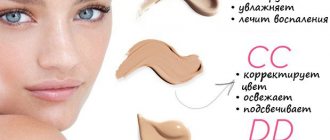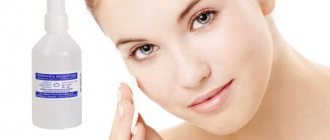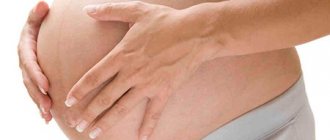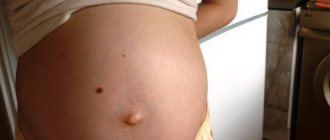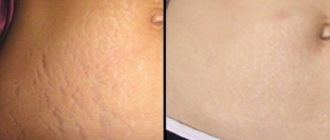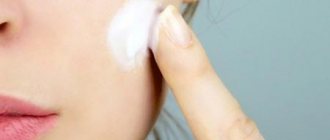Text: Dasha Abramova
Some people forget about coffee and sushi during pregnancy , others indulge in a glass of wine with dinner and don’t bother changing their beauty rituals. The only thing you need to know about self-care during pregnancy is that everyone decides for themselves the first, second, and whatever third. The main thing is that you feel comfortable and that your gynecologist approves of it. As for care, there are some peculiarities here. Dasha Abramova, author of the Byebyeflaw telegram channel, shares a verified list of products.
Can I use cream or not?
Several decades ago, a pregnant woman was carefully protected from any external “invasion”; she was forbidden to dye her hair, use decorative cosmetics, or use facial skin care products. The expectant mother was allowed only folk remedies, at best baby cream.
Today, special lines of cosmetics have been developed for pregnant women, including face creams. Such products are made from natural ingredients, do not contain aggressive substances, and in general the amount of chemical components is reduced to a minimum. All products are gentle, delicate, absorb well, and do not have a strong aroma. Such cosmetics are approved by all doctors, from obstetricians-gynecologists to dermatologists.
Main problems and skin care during pregnancy
A sharp change in hormonal levels is the cause of acne and blackheads. And the increased load on the body and the accumulation of sodium leads to disruption of the water-salt balance and the appearance of edema. These include pigment spots, a tendency to rosacea, and stretch marks, so we take care of the body and face very carefully and thoughtfully. Pregnancy is a natural process, and not a reason to give up on yourself.
An integrated approach is needed - proper nutrition, maintaining a water regime, taking vitamins for pregnant women, selecting safe cosmetics. A massage and contrast shower will also come in handy. They will help keep the skin elastic and quickly return it to normal after childbirth. And a shower is also an excellent training for blood vessels, as well as preventing the appearance of rosacea.
Do you want to know how cosmetologists advise you to take care of your skin during pregnancy? Then watch this video:
Important! Self-care should be regular. Many skin problems may not appear if you take care of them in advance.
Edema and how to deal with it
A ring that is difficult to remove from a finger, problems putting on shoes, bags under the eyes and puffiness are all swelling. Most often they bother the expectant mother in the second half of pregnancy, when the increasing load causes the kidneys to work slower. In addition, the water-salt balance is disrupted. Edema can be dealt with as follows:
- Less salty. Such foods cause thirst, and sodium retains water in the body;
- Drink enough water - at least 2 liters per day. Tea, juice and other drinks cannot replace water. You shouldn't drink too much at night;
- Do not eat immediately before bedtime. This also leads to swelling. The last meal should be 3 hours before bedtime. As a last resort, you can drink a glass of milk or kefir.
External remedies for swelling include lotions made from parsley decoction, grated potatoes, and ice from chamomile infusion. You can also include used tea bags, but the tea must be without additives. Facial skin care at night may include applying a mask or cream, but no later than 2 hours before bedtime. In general, after you have become pregnant, you should treat creams with caution. Be sure to check the composition and prefer natural ingredients.
Acne, dry or oily skin in pregnant women
Increased production of progesterone is the cause of acne in pregnant women. Although the skin becomes drier, poor diet and routine can increase sebum production. In addition, reduced immunity also causes various rashes. You need to do the following:
- Control your diet. It is better not to get carried away with pastries, pies, sausages and smoked meats. Improper functioning of the gastrointestinal tract during pregnancy will result in excess weight and the appearance of acne;
- Cleanse the skin and fight acne with high-quality products that are safe for the expectant mother and baby. As a care product, you can sometimes use a soft scrub or peeling sheet. Once a week you should make a mask of black clay, which fights acne;
- It is better not to overuse decorative cosmetics, but if you urgently need to hide redness or traces of acne, do this with a mineral-based mattifying powder.
Fiber, enough water, and proper nutrition will help keep your skin clean and beautiful. And special cosmetics can cope with unpleasant problems.
Pigment spots and remedies against them
In the second trimester, a pregnant woman's skin begins to intensively produce melatonin and pigment spots may appear. After giving birth, they will gradually go away, but you can apply something now to lighten them and make them less noticeable. For example, wipe your face with lemon juice, which has a whitening effect. You can lubricate stains with castor oil. Fermented milk products are also suitable for combating them. There are also special creams that fade pigment spots.
What to do to prevent pigment spots from appearing? You should use a cream with increased protection from sun rays, preferably for children - it has a more natural composition. Facial care after pregnancy will be more extensive and productive.
Pregnancy is a wonderful period. The shortcomings that appear during the process are temporary, and properly selected care will even get rid of them. Walking in the fresh air, restful sleep, and proper nutrition are important for both the baby and the expectant mother. And natural cosmetics will make your skin beautiful even during this difficult period.
What problems will it solve?
Modern cosmetologists say that pregnant women not only can, but also need to actively use face cream. A good product nourishes, protects, moisturizes, just like usual products, and in addition solves a number of problems that arise only during the period of bearing a child.
A good cream helps cope with:
- with increased skin sensitivity. The body adapts to new conditions of existence, all its systems are rebuilt, reaching a special level of “defense”. Any external fact-irritant, such as frost, heat, individual components in food, household chemicals become “enemy No. 1”, and the skin responds with irritation, redness, and itching.
- with restructuring of the skin. Against the background of hormonal shock, skin type often changes. Many expectant mothers notice that their once oily skin has become normal. On the contrary, the normal one began to shine and shine. Dry skin dries out even more and begins to flake, reacting to the most gentle cleansers. Everything is explained by the work of the hormone estrogen - during pregnancy it is released in large quantities, affecting the condition of the epithelium and the functioning of the sebaceous glands.
- with vascular networks. Spider veins are frequent companions of pregnant women. The fact is that the vessels dilate and become visible on the skin. There is nothing fatal in the phenomenon, no one experiences any discomfort. But from an aesthetic point of view, it looks ugly and becomes a cause of worry.
- with age spots. The period of waiting for a baby is often associated with a disruption in the production of melamine, which is responsible for the production of pigment and skin color. As a result, spots ranging from small to huge appear on the face.
- with acne, pimples. Since the sebaceous glands work intermittently, rashes, pimples, and large acne often appear on the face during pregnancy. The pores become clogged, creating favorable conditions for the proliferation of pathogenic microorganisms.
But some pregnant girls continue to shine, delighting others with their excellent skin condition. Usually these are those who carefully chose a product for daily self-care. We will teach you the basics of choosing a good, safe product.
How does skin change in the third trimester of pregnancy?
There are even more pigment spots. In addition, rosacea often appears. The last trimester of pregnancy is the hardest, both for the expectant mother and for her skin. Weakened immunity also makes itself felt - the body catches infections, including fungal and papillomavirus. It should be strengthened, and you can take a vitamin course again with the doctor’s permission. The skin of the face and body still needs to be thoroughly cleansed, moisturized and nourished. You should not use too strong products - soap with an antibacterial effect, natural masks, massage, baby body oil, and a light moisturizer are quite enough.
Don't know how to carefully cleanse your skin during pregnancy? If the skin needs peeling, it is better to use kiwi pulp. This fruit contains a lot of acids and whitens the skin.
Nutrition should be moderate, you need to drink enough water. Fish, vegetables, fruits, lean meat, and dairy products will be useful. Masks during this period are good from oatmeal and avocado, banana and sour cream, you can add honey. But it should be remembered that during pregnancy, the skin may react to some products with an allergy, even if it was not there before. The body's vulnerability is increased.
Selection rules
On the shelves of cosmetic stores and pharmacies there is a huge selection of creams designed specifically for ladies in anticipation. But can you trust all products? Let's talk about what kind of face cream for pregnant women cosmetologists recommend looking for.
Tips for choosing a cream:
- A future mother's makeup bag must include a moisturizer. Possible with hyaluronic acid. Acid is produced by the body independently, regulating the production of collagen and elastin and almost never causes allergies.
- The cream should not contain fragrances or active substances. Even if you liked the smell very much before pregnancy, it is better to refrain from purchasing it.
- It is better to buy mass-market products marked IDE. This marking indicates that the product has been tested and approved by the European Institute of Dermatology (the institution controls all cosmetic products entering the shelves of European stores). The mark also guarantees that there are no preservatives or harmful parabens in cosmetics.
- Changing skin type is a reason to change your skincare product. If a pregnant woman's oily skin has become normal, and normal skin has become dry, a cream should be selected specifically for the new type.
- To eliminate spider veins, doctors allow the purchase of products containing angioprotectors. Angioprotectors improve blood circulation in blood vessels and improve wall permeability.
There is no way to get rid of acne during pregnancy. Dermatologists recommend postponing radical procedures and carrying them out after the birth of the baby. But you can purchase a product that regulates the functioning of the sebaceous glands, removes oily shine, and has an anti-inflammatory and drying effect. And, of course, any cream during pregnancy simply must be hypoallergenic.
Face
In general, there is no need to radically change your facial care - most likely, you will just have to slightly adjust the scheme. During pregnancy, the skin becomes more sensitive, acne may appear (especially likely in the first or third trimester), irritation, and rosacea. It is best to stick to hypoallergenic products: plant extracts can cause an unpredictable reaction.
As skin sensitivity increases, you should handle acids and essential oils carefully. It is also worth abandoning medicinal ointments against acne with benzoyl peroxide, retinol and, of course, hormonal agents. There are many pharmacy lines for sensitive skin: La Roche-Posay Toleriane, Bioderma Sensibio, Avène Tolérance. SPF is also important - no one should forget about it, including non-pregnant people. The main thing is to always consult a gynecologist about everything, even if it seems insignificant.
La Roche-Posay Toleriane Teint
Fluid foundation for hypersensitive skin. It is especially suitable for girls prone to rosacea - and not necessarily during pregnancy. It has a calming effect thanks to its thermal water content and provides sun protection (SPF 25). The product has a very light texture and a natural semi-matte finish; there are three tones to choose from. A small life hack - you can use it spot on as a corrector.
Bioderma Sensibio H2O Micelle Solution
An extremely versatile product that can be found in cosmetic bags not only among pregnant women, but also, for example, among makeup artists at fashion weeks. The secret is that it is suitable for fragile, thin and sensitive skin. This famous micellar water perfectly cleanses and really removes even waterproof makeup. Does not contain alkali, alcohol or flavorings.
"Cora", anti-stress cream for all skin types, including sensitive
The cream of the Russian brand is suitable not only for daily care, but also for restoring the skin after various stressful situations. For example, hypothermia, prolonged exposure to the sun or chemical peels. In short, it can be used by those with not only very sensitive skin, but also those with irritated and injured skin. Strengthens protective functions, gives a matte finish and is suitable as a base for makeup.
Payot Sensi Expert Gel Yeux Dermo-Apaisant
The Sensi Expert line is designed specifically for sensitive skin and is well tolerated due to the absence of fragrances and dyes. Gel-cream for the eye area soothes and moisturizes the skin, and also brightens dark circles. The main thing that expectant mothers will appreciate is that it fights puffiness and swelling under the eyes.
Matis Reponse Delicate Face Care Mask
Another product for sensitive skin, but note that it is not hypoallergenic - it contains plant extracts. These are such soothing ingredients as calendula, St. John's wort, cornflower, medicinal chamomile. The mask has a gel texture, it slightly cools and tightens the skin. The product improves complexion, especially if the skin is prone to redness - a problem that pregnant women often face. Can be applied to the entire face and neck, or specifically to areas of irritation. For more delicate care, manufacturers recommend not rinsing off the mask with water, but removing it with cotton pads soaked in lotion for sensitive skin from the same brand line.
Prohibited substances
Usually doctors have nothing against creams that a woman is used to before pregnancy. But in some cases (especially if the pregnancy is accompanied by complications, there is a threat of premature birth, the tone of the uterus is increased), they strongly advise paying attention to the composition of the product. It is worth discarding it if the cream contains certain substances.
What could be potentially dangerous for pregnant women:
- retinoids. It would seem that what’s wrong with vitamin A-based components? But retinoids, which usually effectively fight wrinkles and help renew the epithelium at the cellular level, can lead to delays in fetal development. Retinoids are labeled Tazorac, Avage, Differin, Retin-A, Renova, Retinol.
- salicylic acid. Creams with salicylic acid cannot be used while expecting a baby, although it is very often included in creams for acne and any rashes. When pregnant, it is dangerous due to pathologies of fetal development, complications of pregnancy, and premature birth. You can recognize its presence by the designations BHA, Salicylic acid.
- Phtalates. Esters and salts of phthalic acid easily penetrate the placenta, reaching the child directly. They can lead to changes in the newborn’s body and affect the child’s growth: lead to hyperactivity syndrome and even manifestations of aggression. They are designated.
- sodium lauryl sulfate (SLS, SLES) are carcinogenic substances that in certain concentrations cause intoxication of the expectant mother and fetus.
- parabens (PA). are included in almost all cosmetic products to increase shelf life. According to recent studies, they can cause tumors, provoke breast cancer, and lead to pathologies of the reproductive system.
- glautathione, hydrochiron (Glutathion, Gidrohiron). These are essential elements in whitening creams and artificial melamine synthesizers. They are very toxic and dangerous for pregnant women.
- ethylene oxide (ethylene oxide). It gives the skin softness and smoothes, although it is a powerful carcinogen. Oxide can lead to fetal mutations.
- hormones. The effect of hormones on the body of a pregnant woman has not been fully studied and is therefore potentially dangerous.
- benzenes cause anemia and are destroyers of human bone marrow.
Some natural ingredients can also be dangerous. These are, for example, plant esters with bright aromas. They often provoke an allergic reaction and the appearance of hives. In the worst cases, it all ends with Quincke's edema.
We'll tell you what a high-quality cream for pregnant women should contain.
Body
As for body care, the main vectors here are hydration, preventing stretch marks and combating swelling. If with hydration everything is more or less clear, then with stretch marks everything is more complicated. Many people still believe that they can be prevented with the help of special creams. Another opinion, common on forums for expectant mothers, is that stretch marks cannot be gotten rid of. Both are not true. If you don't get stretch marks, it's because of your genetics. And if they have appeared and you want to correct them, then know that modern cosmetology is capable of much, including fighting scars.
There are special products to prevent stretch marks, and it is better to pay attention to specialized brands for pregnant and nursing mothers. These are, for example, Babyline, Maternea, Mustela, Mothercare. They have cosmetics for stretch marks, breast skin care, as well as everything necessary for a child. Their main advantage over conventional brands is price. Other frequent companions of pregnancy are varicose veins and edema. The main helpers in this problem are cooling creams, compression garments and special massage for pregnant women (do not forget to consult a gynecologist in everything).
Thalion Performance Vergetures
A remedy for stretch marks that renews elastin and collagen fibers. It is recommended to start using it as early as possible before a significant weight jump and at least twice a day. Shea and borage oils help restore the balance of nutrients and maintain skin elasticity, while unsaturated fatty acids are involved in tissue regeneration.
L'Occitane Frisson de Verveine Ice Gel for Legs and Feet
A refreshing gel in the form of a roll-on is a must-have to end the day. Absorbs quickly and instantly cools. It will be useful not only for pregnant women, but also for anyone who spends a lot of time on their feet, loves heels, or notices that their feet swell a little in the evening. The gel does not have a strong odor and does not leave a sticky feeling.
Elemis Japanese Camellia Oil Blend
This oil is a leader among remedies for stretch marks. He is idolized by celebrities, including Victoria Beckham, who has been pregnant four times already. You can use it before, during and after pregnancy, and also massage your newborn with it. Japanese camellia oil is rich in plant collagen and supports skin elasticity. Well, no fragrances or dyes, of course.
"Bepantol", emulsion for stretch marks
In general, Bepanten products will come in handy more than once: both for the expectant mother during lactation and for the child with diaper rash. Not so long ago they also came out with a remedy for stretch marks. Its main bonus in comparison with, for example, oils is that the emulsion is quickly absorbed and does not leave marks on clothes. If you use it in the morning, you can get dressed almost immediately.
Vichy Deodorant 24HR Deodorant Dry Touch Aluminum Salts Free
Antiperspirants contain aluminum salts: they block the sebaceous glands and make the antiperspirant effective. During pregnancy, many girls decide to give up products containing them and switch to deodorants. Vichy has deodorants for all occasions, and they are truly effective. This product contains no salts, no alcohol, no parabens, and is suitable even for hypersensitive skin. But the choice of aluminum-free products is large, here, for example, a girl blogger has compiled an exhaustive list.
Photos: Shop-Apotheke, API, CORA, Lilmart, Skincity, Thalion, L'Occitane, John Lewis, Feelunique
Recommended composition
You can use face creams during pregnancy with neutral ingredients, soft texture, and an unobtrusive delicate aroma. The priority is natural products and composition without chemicals.
Required components:
- vegetable oils (preferably cold pressed). Moisturizes and smoothes.
- animal fats. Nourishes and gives skin elasticity.
- hyaluronic acid. One of the best moisturizing ingredients. Helps the skin renew itself, helps collagen and elastin to be produced naturally.
- extracts of tea tree, aloe, green tea. They soothe, relieve irritation, and prevent any inflammatory processes.
- vitamins C, A. Renew, restore tone.
- Amino acids. Maintain youth and elasticity, nourish from the inside.
Fruit acids (in low concentrations), allatoin, and panthenol are also allowed. The former help cleanse the skin of dead cells and have a slight whitening effect. The second - soothe, serve as a prevention of any inflammation. Cream for pregnant women must be tested by dermatologists and have certificates. Cosmetologists advise purchasing them only in pharmacies.
Protection: should I wear gloves?
As you know, it is easier and more pleasant to engage in prevention than treatment. Therefore, protect your hands from any adverse effects. Before doing household work, be sure to wear household gloves. Many women, knowing the benefits of gloves, still prefer to do without them. This is motivated by inconvenience and unusual sensations. Really, the trick is finding the right size and texture of gloves (thankfully, there are plenty to choose from now), and forming a habit (on average, this takes about 2-3 weeks). To make it more comfortable, before putting on gloves, powder your clean and dry hands with talcum powder. Believe me, the result - beautiful hands for many years - is worth it. Contact with the ground, even when transplanting indoor flowers, also requires hand protection. This precaution will also protect a pregnant woman from possible infection with diseases such as toxoplasmosis.
In winter, also do not forget about gloves and mittens. They should be put on in a warm place, a minute before going outside. This will protect your hands from hypothermia, chapping, and keep your skin soft.
The best choice for pregnant women – what does the expectant mother’s skin need?
The requirements for the production of creams for expectant mothers are quite high, but on the shelves you can see many brands of expensive and affordable ones. Russian and foreign companies are vying with each other to offer facial products for use during pregnancy. We offer a list of cosmetic brands that have earned the best recommendations.
Buyer ratings are topped by:
- Avent
- Weleda
- Mustela
- Our mother.
- Mom Comfort.
- Chicco.
- Helan Linea Mamma.
These creams have different purposes: some protect from UV rays, others nourish, and others moisturize. The composition is different everywhere, but completely safe and approved by dermatologists. There is no universal cream for all occasions. For nutrition and hydration, day and night care, you need fundamentally different products.
How to properly care for your facial skin during pregnancy:
We nourish and saturate
During all nine months it is important to nourish the skin, saturate it with minerals and amino acids. Then the skin will remain radiant and the complexion will remain fresh. For dry skin types, it is necessary to have a nourishing cream that is well absorbed. If the skin is not nourished, it will crack and a feeling of tightness will persist. Look for a cream with animal fats, a powerful vitamin complex, elastin and collagen. It is important to use the product an hour before bedtime on cleansed skin. If necessary, always remove excess with a soft cloth.
We support youth
Regenerating creams renew natural synthesis processes, maintain youth and fill all layers of the skin with nutrients. During pregnancy, this is important for maintaining the overall tone and immunity of the epithelium. Healthy skin actively resists external irritants and is less prone to pigmentation and acne. For pregnant women, creams have been created with amino acids, antioxidants, extracts of medicinal herbs (only those that do not cause allergies!), vegetable oils and collagen. They should be used before bedtime, and in the morning immediately after waking up.
Is it possible to peel the skin of your hands during pregnancy?
With lemon halves you can not only clean your fingertips, but also exfoliate (remove the surface layer of skin) for rough skin on your elbows. To do this, wipe the skin of your elbows with a slice or half of a lemon. Then you should wash your hands again.
The skin of the hands, like all other parts of the body, requires not only daily cleansing, but also regular exfoliation of dead cells. There are special hand peelings for this purpose.
Such peelings are usually based on fruit acids (chemical) or contain abrasive particles (scrubs). They differ from facial peels by having a more intense effect. But body peeling may be suitable for this purpose. The exfoliating agent is applied for 5-10 minutes (exact recommendations should be on the product label), after which it is washed off with warm water. Peeling can also be coffee grounds or corn grits with the addition of shower gel or liquid soap. Massage the mixture into your hands and rinse with water. After washing, be sure to dry your hands with a soft towel - this will prevent them from drying out.
Protecting yourself from the sun
The choice of sunscreen cosmetics for pregnant women is important for everyone who is pregnant in the summer. The active sun is harmful, dries out the skin, provokes the appearance of age spots and irritation. It is important to choose creams with high SPF factors, at least 30+.
Waiting for a baby is a time of surprises that the body presents to us from time to time. In addition to constant changes in mood and culinary preferences, we notice unpleasant changes in the mirror. But any mother has the power to make the period enjoyable, without sacrificing beauty for the sake of the baby. A beautiful mother means a happy one, then the baby will be born healthy and happy.
Cosmetics during pregnancy and lactation: is it possible or not?
Pregnancy is an exciting and magical period in the life of every woman. The thoughts of expectant mothers are occupied with the expectation of a miracle and the upcoming motherhood. But still, women remain women, and they really want to look attractive.
It is not easy to choose cosmetics during pregnancy and breastfeeding, since “chemicals” are extremely undesirable. How to be? Shouldn't we switch to homemade cosmetics using grandma's recipes?
Of course, it is absolutely not necessary to completely abandon the usual creams, lotions and masks, especially since while expecting a child, a woman’s hormonal levels change, and the condition of her skin worsens. But you need to choose cosmetics very carefully. Sometimes familiar cosmetics, completely harmless in normal conditions, can be harmful for a pregnant or lactating woman. Why?
Everything that enters our body during pregnancy affects the unborn child in one way or another. Any effective and efficient cosmetics contains active substances of chemical origin. It’s not worth looking for the “contraindication: pregnancy” note even on professional products. However, cosmetics are not medicines. But every woman “in an interesting position” needs to know which cosmetic products are not advisable to use.
In addition, not all cosmetics can be used after the birth of the child. Firstly, toxic substances contained in some cosmetics can pass into breast milk. And secondly, the female body after childbirth is extremely sensitive and can react unusually even to usual remedies.
So, what cosmetics should be excluded during pregnancy and lactation?
:
1. Products with retinol. Often these are anti-aging cosmetics and products that help fight acne.
Dangerous during pregnancy!
Large amounts of retinol can lead to disturbances in fetal development.
If you use products from the A-Nox Plus Retinol line from the well-known Israeli brand Holy Land, replace them with products from the A-Nox series (with the exception of Holy Land A-Nox Hydratant Cream) or Double Action. It is also undesirable to use cosmetics from the Alpha-Beta Retinol line. Use Lactolan series products instead.
The Retinol Forte line of another popular Israeli brand GiGi is also not recommended for pregnant women. Many Retinol Forte products can be replaced with Recovery line products.
Finally, it is worth keeping in mind that retinol or retinol palmitate contains Holy Land Age Control Super-Lift, Holy Land Renew Formula Hydro-Soft Cream, Holy Land Vitalise Moisturizing Cream.
2. Skin whitening products containing hydroquinone, arbutin or kojic acid. Kojic acid can be used in cosmetics for problem skin.
Dangerous during pregnancy and breastfeeding!
Hydroquinone is a toxic substance that in high concentrations is harmful to the human body. Arbutin and kojic acid are less toxic ingredients, but they cause cell mutation.
The following products contain hydroquinone:
- Mont Clinic Anti-pigmentation brightening facial concentrate in microcapsules
- Christian Breton Corrective Eye Contour Serum
- Christina Peelosophy Cream for lightening hyperpigmentation of the skin, reducing the formation of melanin
Arbutin and kojic acid are found in the following products:
- Holy Land Whitening Mask
- Holy Land Whitening Protective Moist
- Christina FluorOxygen+C Brightening Botanical Vitamin C Serum
- Arcadia Whitening cream
- Arcadia Eye Gel
- GiGi Quadro Multi Application Whitening Serum
- GiGi Quadro Multi Application Gel for oily and problem skin
Many people experience age spots on the face during pregnancy.
There is no need to bleach them; it is better to disguise them with mattifying agents. 3. Products with salicylic acid. These are foams, scrubs and creams for the care of oily and problem skin.
Dangerous during pregnancy and breastfeeding!
Salicylic acid increases the risk of fetal defects. And during lactation it can provoke the appearance of age spots.
It is advisable to avoid products from the Christina Comodex line and the following Christina brand products:
- Christina Porcelan Porcelan Tightening Mask for oily and problem skin
- Christina Forever Young Body Scrub
- Christina Peelosophy Cream for improving complexion, activating blood microcirculation
- Christina Peelosophy Cream for the care of oily and problematic skin, helping to eliminate comedones
- Christina Peelosophy Protective foundation
- Christina Bio Phyto Bio-phyto-peeling for home use
The Christina brand has safe products for problematic and oily skin in the Christina Sea Herbal line.
It is not advisable to use a number of GiGi brand Derma Clear products:
- GiGi Derma Clear Mattifying Serum
- GiGi Derma Clear Moisturizing Protective Cream SPF 15
- GiGi Derma Clear Gel for local treatment of rashes and spots
They can be replaced with cosmetics for oily skin from the Lotus Beauty line.
You should not use these products containing salicylic acid during pregnancy:
- Bark Mousse for cleansing problematic and oily skin with prebiotic
- New Line Cleansing gel for oily and combination skin
- New Line Dry mask for oily skin with sebum-regulating effect
4. Products with sodium lauryl sulfate (SLS).
This component is found in shampoos, shower gels and bath foams. Dangerous during breastfeeding!
Sodium lauryl sulfate can cause allergies in both mother and baby.
Many popular brands include SLS in shampoos and gels, so before purchasing products, it is important to carefully study their composition. Products from the German cosmetics brand Weleda do not contain SLS. In general, during breastfeeding, it is better for a woman to switch to baby shampoos and foams.
In conclusion, we emphasize that during pregnancy the skin becomes more sensitive, and the reaction to aromas becomes stronger. You should not use cosmetics with rich, heavy odors. It may cause nausea and dizziness. During lactation, you should not use creams, lotions or shower gels with a noticeable odor at all - your baby will not like the aroma, and he may refuse to breastfeed. Apply moisturizing creams for the breasts and décolleté areas strictly after feeding, so that the product has time to be absorbed by the next feeding!
And one more thing: during pregnancy and after the birth of a baby, a woman’s hormonal levels are unstable. Even completely natural remedies can provoke an allergic reaction, and the use of antihistamines at this time is contraindicated. Therefore, before applying cosmetics to your face, it is recommended to try the products on the back of your wrist.

